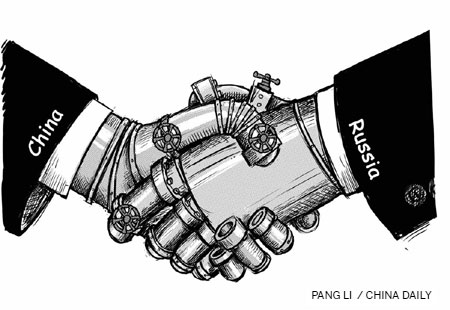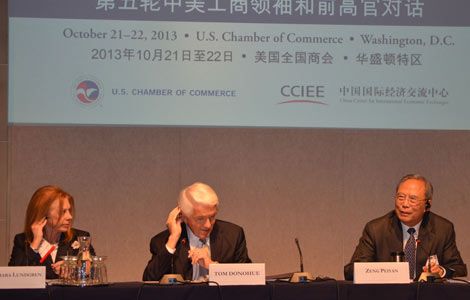Energy alliance for better future
Updated: 2013-10-25 07:04
By Dmitri Trenin (China Daily)
|
||||||||
Dmitri Medvedev's first visit to China as Russia's prime minister will further cement Beijing-Moscow energy relationship. This alliance rests on a simple formula: substantial Chinese credits for long-term Russian energy supplies. Thus, cash-rich China buys a measure of energy security, and Russia gets much-needed cash for its budget. In the current geopolitical setting, however, this essentially pragmatic relationship acquires features of an energy alliance.
Since 2009, China has been Russia's biggest trading partner. The two-way trade, which stood at $88 billion last year, is finely balanced between exports and imports. There is a huge imbalance, however, as far as the trade structure is concerned. About 90 percent of Russian exports are hydrocarbons; machinery accounts for less than 1 percent. Despite the Russian government's professed desire to diversify the country's exports, the energy element has only grown in the past few years. Russia has become one of China's energy bases.
Russia's advantage as an energy source, in Chinese eyes, is that its supplies cross into China over land, and directly. Unlike sea routes, they are essentially protected from third-country interference. Pipelines also tie Russia to the Chinese market, and give Beijing leverage in case of a dispute.
The fact that China has other similar continental sources besides Russia, such as Myanmar and Central Asia, further increases Beijing's power. China these days is very much a buyers' market.
Russian-Chinese energy deals are complex. Beijing places a big order with Moscow and expects to get a discount. This has worked for oil, with Rosneft concluding a series of agreements with China National Petroleum Corporation, and now also with China Petroleum and Chemical Corporation (or Sinopec) - in an attempt at in-country diversification of partners. It has not yet worked for gas. And although a final agreement on the gas price is expected before the end of this year, it has been "imminent" since mid-2011.
Also, China has been able to engage Russia's largest private gas producer, Novatek, in a long-term deal. The deal, concluded last June, marks a new milestone. Russia, until recently reluctant to allow China's State-owned companies direct access to its energy resources, has softened its stance. Thanks to the Novatek deal, CNPC will now have a direct stake in a gas field on the Yamal Peninsula.
The deal struck in Beijing with Rosneft promises even more: joint exploration and exploitation of oil and gas reserves in eastern Siberia. Such agreements effectively turn the Chinese-Russian energy trade into an energy alliance.
The alliance is a product of growing bilateral relations, but it also reflects developments in the global energy market. The shale gas revolution in the United States has caused serious changes in international energy flows. Europe's energy diversification policies have resulted in Russian natural gas giant Gazprom's share of the European Union market diminishing. China, which Gazprom until recently didn't regard as a potential market but as leverage against Europe, is being considered more seriously - even if the Russians will have to give their Chinese partners some discount on price.
Non-energy geopolitics also plays a role. Since being elected Russia's president in 2012, Vladimir Putin has focused on Eurasian integration. The latest iteration of his "Greater Europe" idea foresees a binary relationship between the EU and a Moscow-led "Eurasian Union", not, as a decade before, Russia's growing integration with the EU.
Putin has also focused on the Russian Far East and Siberia, and has been experimenting with different bureaucratic models to launch its development. Through the Far East, Putin is looking for an opening to Asia and the Pacific, which, because of its dynamism, he regards as more important than Europe.
In this context, China is Russia's key partner. It is also an ally in implementing Putin's vision of a world order based on big-power consensus, without an obvious hegemony. Putin, however, has made it clear that he sees Russia as nobody's junior partner. This overtly applies to the US. It also applies, if less overtly, to China.
Even though the balance of national might in the past 30 years has been inexorably moving in Beijing's favor, Moscow will only accept co-equality in the relationship. Co-equal relations between unequal powers - such is the formula behind Moscow's policies toward partners which are bigger powers than Russia: the US, China, and (in economic terms) Europe. It is easier said than done, as the Russian-Chinese energy alliance illustrates, but Putin will persevere.
The author is director of the Carnegie Moscow Center.

(China Daily 10/25/2013 page9)

 Giant duck to exit after drawing the crowds
Giant duck to exit after drawing the crowds
 Ministry to begin inspecting most heavily polluted regions
Ministry to begin inspecting most heavily polluted regions
 Spy claims stir rebuke to Obama
Spy claims stir rebuke to Obama
 Paint the world a picture
Paint the world a picture
 World's first 1-liter car debuts in Beijing
World's first 1-liter car debuts in Beijing
 Latin American clown convention
Latin American clown convention
 Prince George baptized in London
Prince George baptized in London
 Mass. teacher slain; 14-year-old student charged
Mass. teacher slain; 14-year-old student charged
Most Viewed
Editor's Picks

|

|

|

|

|

|
Today's Top News
US firms urge easier process for investment
China calls for strengthened EU ties
Spy claims stir rebuke to Obama
Traders in Yiwu cashing in on e-commerce shops
PMI heads for 7-month high
Ministry to inspect most heavily polluted regions
Ban to help protect kids from sexual predators
Returnees are 'seed capital' for startups
US Weekly

|

|








